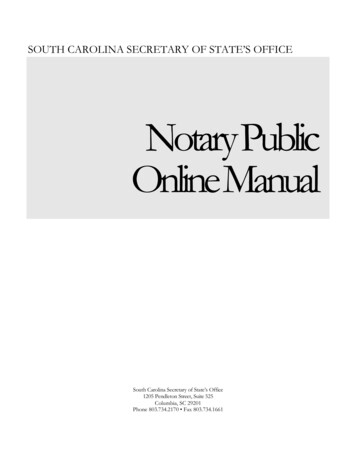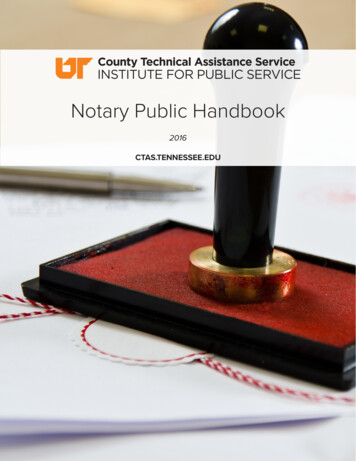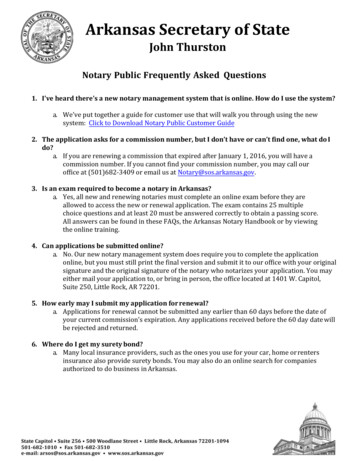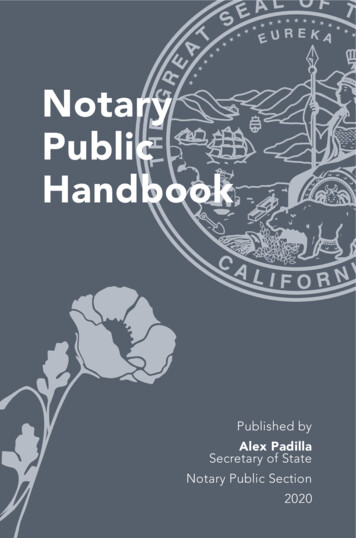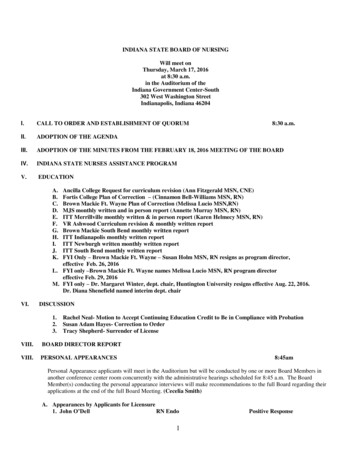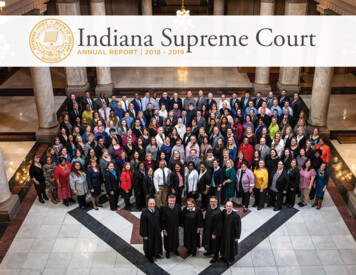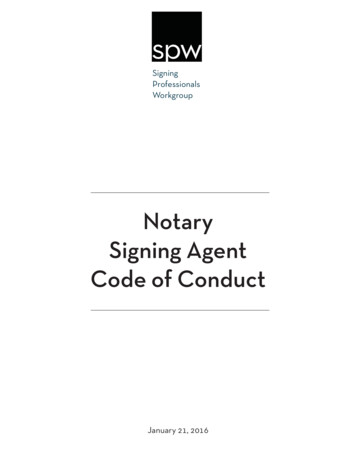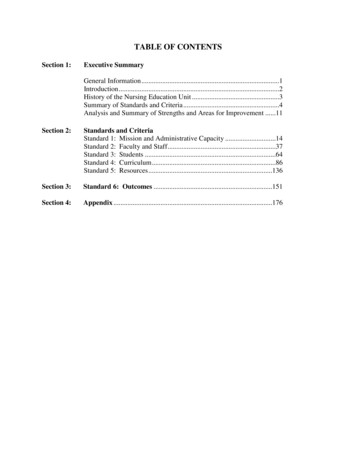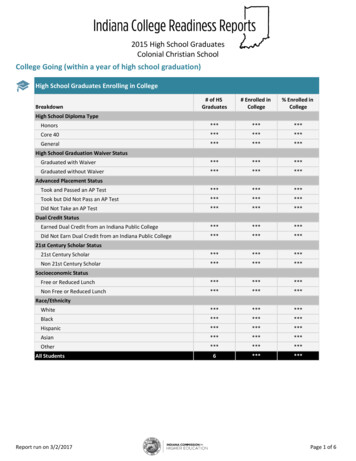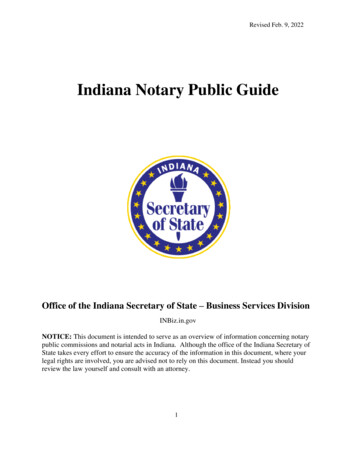
Transcription
Revised Feb. 9, 2022Indiana Notary Public GuideOffice of the Indiana Secretary of State – Business Services DivisionINBiz.in.govNOTICE: This document is intended to serve as an overview of information concerning notarypublic commissions and notarial acts in Indiana. Although the office of the Indiana Secretary ofState takes every effort to ensure the accuracy of the information in this document, where yourlegal rights are involved, you are advised not to rely on this document. Instead you shouldreview the law yourself and consult with an attorney.1
Revised Feb. 9, 2022Table of ContentsOffice of the Indiana Secretary of State – Business Services Division . 1Resources . 4IC 33-42-0.5-18 . 6Qualifications to Become a Notary . 8Applying for an Indiana Notary Commission. 10Maintaining an Indiana Notary Commission . 10Indiana Public Officials that may Perform Notary Functions . 12Duties and Responsibilities of a Notary Public . 12Notarial Certificates . 15Notary Seal . 17Jurisdiction of a Notary Public . 18Conflicts of Interest. 18Certified Copies and True Copies . 19Identification . 20Notarizing in Special Circumstances . 21Notaries Who Are Employees. 22Fraudulent Advertising and Notario Publico Law . 22Notary Fees . 23Secretary of State Apostilles/Authentications . 23Constitutional Prohibition on Dual Office Holding. 23Real Estate and Loan Closings; Title Agents . 24Blank Documents and Undated, Post-Dated and Anti-Dated NotarialCertificates . 25Notary Associations and Resources . 25Notary Liability . 25Notary Journals . 27Examples of Notary Journals and Entries . 28Remote Notarization . 29Electronic Notarization . 37Complaints and Notary Misconduct. 38Frequently Asked Questions . 392
Revised Feb. 9, 2022Appendix I . 46Appendix II . 47IC 3-5-5-0.5 . 47IC 3-5-5-1 . 47IC 3-5-5-2 . 47IC 3-5-5-3 . 47IC 3-5-5-4 . 47IC 3-5-5-5 . 47IC 3-5-5-6 . 48IC 3-5-5-7 . 48IC 3-5-5-8 . 48IC 3-5-5-9 . 49IC 3-5-5-10 . 49IC 3-5-5-11 . 49IC 3-5-5-12 . 49IC 3-5-5-13 . 49IC 3-5-5-14 . 49IC 3-5-5-15 . 50IC 3-5-5-16 . 50IC 3-5-5-17 . 50IC 3-5-5-18 . 50Appendix III . 51Title Insurance Producer License for Notaries Conducting Real EstateClosings (Real Estate Sales, Financing andRefinancing) . 51Appendix IV - Notarial Certificate Examples . 52SAMPLE CERTIFICATE FOR AN ACKNOWLEDGMENT IN AN INDIVIDUALCAPACITY . 52SAMPLE CERTIFICATE FOR WITNESSING OR ATTESTING A SIGNATURE. 56SAMPLE CERTIFICATE FOR A COPY CERTIFICATION . 57Appendix V - Glossary of Notarial Terms . 59Appendix VI - Notary Guide Version History. 603
Revised Feb. 9, 2022ResourcesIndiana Secretary of State, Business Services DivisionWeb: INBiz.in.govEmail: notary@sos.in.gov or https://inbiz.in.gov/about/contactPhone: 317-234-9768Mail: Indiana Secretary of StateNotary Division302 West Washington St. Room E-018Indianapolis, IN 46204Controlling Authority: Indiana Code 33-42 et. seq. (see appendix I. for a breakdown of governing law) Indiana Administrative Code Title 75, Article 74
Revised Feb. 9, 2022What Is a Notary? A notary is a public official who is appointed by the state whose purpose is toserve the public as an impartial witness in performing a variety of official fraud-deterrent actsrelated to the signing of important documents. In Indiana, notary publics are appointed by theGovernor and are commissioned by the Secretary of State. Depending on how a document iswritten, a notarization serves to affirm the identity of a signer and the fact that they personallyexecuted their signature. A notarization, or notarial act, officially documents the identity of aparty to a document or transaction and the occasion of the signing that others can rely upon,usually at face value. A notary’s authentication is intended to be reliable, to avoid theinconvenience of having to locate a signer to have them personally verify their signature, as wellas to document the execution of a document perhaps long after the lifetime of the signer and thenotary. An oath is a sworn statement. In most cases a person will swear that a written statement,oral statement, or testimony they are about to give is true. A notary can document that the notaryadministered an oath to an individual. In the alternative, a notary can notarize an individual’ssignature on a document (affidavit) setting forth the information that a person swears is true orthe oath they will abide by.There are four basic components of a notary public. He or she serves as a law abiding, bonded,impartial, public official.Law abiding:A notary’s key functions are to acknowledge and witness the signing of documents, andadminister oaths and affirmations related to the signing of important documents so that publiccan rely upon the documents, and to act as a deterrence to fraud. Hoosiers expect notaries to behonest and faithful to the law. Notaries must take an oath to obey the laws of the United Statesand the State of Indiana. No person failing to meet the eligibility requirements under IC 33-4212-1(b); failing to meet the moral character provision under IC 33-42-13-1(c); engaging in anyprohibited act under IC 33-42-13-3; or who has been conviction under IC 5-8-3-1 is permitted tohold a notary public commission.Bonded:Before receiving an Indiana notary commission an applicant must secure an approved 25,000.00 official surety bond (see Indiana Code 33-42-12-1(c)(4)).Impartial:The role of a notary is to be an impartial witness to a signature, oath or affidavit. A notarial actserves as a legal attestation to, and presumptive evidence of, a signing, oath taking or swearing toan affidavit. A notary’s impartiality is expected and required. Under state and common law, anotary may not notarize their own signature, the notary’s spouse’s signature, or any party thatmay directly benefit the notary or the notary’s spouse (see Indiana Code 33-42-13-3).Public official:5
Revised Feb. 9, 2022A notary public is commissioned by the state and serves as a public official. Notaries must meetand maintain many of the same qualifications as other state appointed and elected publicofficials. The term of the office of notary public is 8 years and a notary’s jurisdiction is statewide. Though notaries are appointed to serve the public, an Indiana notary may not be compelledto provide any particular notarial act.Most of the law concerning notaries and notarial acts can be found in the Indiana Code, Title 33Article 42 (see Appendix I). Keep in mind however that laws are subject to change. IndianaCode Title 33, Article 42, Chapter 0.5, Section 18 (cited as IC 33-42-0.5-18) provides fornotarial acts in Indiana:IC 33-42-0.5-18“Notarial act” means the following acts with respect to either a tangible or an electronicrecord:(1) Taking an acknowledgment.(2) Administering an oath or affirmation.(3) Taking a verification on an oath or affirmation.(4) Attesting to or witnessing a signature.(5) Attesting to or certifying a copy of:(A) a tangible document or record; or(B) an electronic document or record.(6) Noting a protest of a negotiable record.(7) Any other act authorized by common law or the custom of merchants.Some aspects of the office of notary public and practice as a notary public are also governed bythe Indiana Constitution, agency rules and published court opinions, sometimes referred to ascommon law. The Indiana Secretary of State receives applications for notary commissions,administers the commissioning process and keeps the roll of active notaries public. TheSecretary of State has limited authority to revoke a notary’s commission for certain types ofmisconduct. Conduct that can result in revocation of a notary commission is detailed in IndianaCode 33-42-13-3. A judge of a county circuit or superior court in the county in which a notaryresides or is primarily employed may also revoke a notary’s commission.IC 33-42-13-3 ProhibitionsSec. 3. (a) A commission as a notary public does not allow a person to do the following:(1) Provide legal advice or otherwise practice law.(2) Act as an immigration consultant or provide advice on immigration matters.(3) Represent a person in an administrative or judicial proceeding related to citizenship orimmigration.(4) Use an initial or name, other than the initial or name under which the notary publichas been commissioned, to sign an acknowledgment.(5) Take an acknowledgment or administer an oath to any person the notary public knowsat the time to be:(A) adjudicated mentally incompetent; or6
Revised Feb. 9, 2022(B) under a guardianship described in IC 29-3.(6) Take an acknowledgment from any person who is blind without first reading therecord to the person who is blind.(7) Take the acknowledgment of any person who does not speak or understand theEnglish language unless the nature and effect of the record is translated into a languagethe person speaks or understands.(8) Take the acknowledgment of a record without witnessing a signature or receiving anacknowledgment from the principal that the signature is authentic.(9) Take a verification of an affidavit or oath in the absence of an affirmation of truth bythe affiant.(10) Perform a notarial act for:(A) oneself;(B) one’s spouse; or(C) any party;that may directly benefit any person described in clauses (A) through (C).(b) A notary public may not engage in false or deceptive advertising.(c) A notary public, other than an attorney licensed to practice law in Indiana, may notuse the term “notario” or “notario publico”.(d) Except as provided in subsection (g), a notary public may not advertise or representthat the notary public can draft legal documents, provide legal advice, or otherwisepractice law. Any notary public who advertises notarial services shall include thefollowing statement in each advertisement:“I am not an attorney licensed to practice law in Indiana. I am not allowed to draft legalrecords, give advice on legal matters, including immigration, or charge a fee for thoseactivities.”.(e) The statement described in subsection (d) shall be translated into every language usedin an advertisement.(f) If size or space restrictions make it impossible for the statement to be incorporatedinto an advertisement, the statement described in subsection (d) shall be prominentlydisplayed at the site of where notarial act is performed. A display described in thissubsection must be shown before the performance of a notarial act.(g) Subsections (c) through (f) do not apply to a notary public who is licensed to practicelaw in Indiana.(h) Unless otherwise permitted by law, a notary public may not withhold access to orpossession of an original record provided by a person seeking the performance of anotarial act by a notary public.(i) A notary public who violates this chapter may have the notary public’s commissionrevoked by a judge with jurisdiction in the county in which the notary public resides or isprimarily employed.(j) A notary public whose commission has been revoked may not reapply for a newcommission until five (5) years after the revocation.(k) A notary public who has been convicted of notario public deception under section 4of this chapter may not reapply for a new commission.(l) If the secretary of state revokes the commission of a notary7
Revised Feb. 9, 2022public, the notary public may not reapply for a new commission for five (5) years.(m) A notary public may not perform a notarial act when the notary public's commissionis suspended or revoked.Qualifications to Become a NotaryIn order to qualify for an Indiana notary public commission, the applicant must meet thefollowing criteria at the time of application and throughout their term of service:a) Be at least 18 years of age.b) Be a citizen or permanent legal resident of the United States. Note: non U.S.citizens must have visa or immigration status allowing permanent residence in theU.S. in order to be eligible to serve as an Indiana notary.c) Be either: a full-time, permanent resident of the state of Indiana or primarilyemployed in the state of Indiana. An Indiana notary must continuously maintaintheir Indiana residency or their Indiana employment. If at any time an Indiana notaryceases to be a full-time resident of the state of Indiana, or, in the case of a nonresident employee, the Indiana notary ceases to be primarily employed in Indiana,their commission becomes invalid and must be relinquished. Legal requirements forIndiana residency are the same residency requirements for voter registration and aredetailed in Indiana Code 3-5-5 “Standards for Determining Residency” (seeAppendix II).d) Possess an Indiana driver’s license, Indiana non-driver identification card or otheracceptable form of identification to prove Indiana residence or possess proof ofemployment in the State of Indiana. When applying for a notary commission, anapplicant who is primarily employed in the state of Indiana must provide a writtenstatement documenting employment on company letterhead (see IndianaAdministrative Code, Title 75, Article 7, Rule 2-2(c)(3)).e) Never have committed an act or omission that demonstrates a deficiency incompetence, honesty, integrity, or reliability, including any of the following, foundin Indiana Code 33-42-13 or have been convicted of a crime which woulddisqualify the applicant from holding a public office in the state of Indiana,1 unlessthe individual has petitioned for and received an order of criminal history1Indiana Code 5-8-1-38; 5-8-3-1 and IC 3-8-1-5 provide that a public officer (i.e. notary public) is disqualified fromholding office, and removed by operation of law from an office currently being held, if convicted of a crime inwhich they might have been imprisoned for more than one year or in which the sentence imposed exceeds 6 months.Criminal disqualification applies even if the sentence is served under house arrest or on probation.8
Revised Feb. 9, 2022expungement under Indiana Code 35-38-92. A conviction that has been reversed,vacated, set aside or “expunged” under IC 35-38-9 would not serve to disqualify aperson from holding a notary commission. An act or omission that demonstrates adeficiency in competence, honesty, integrity, or reliability includes:(1) Any failure to comply with the requirements of this article or rules adopted underthis article.(2) Any deceitful, dishonest, or fraudulent statement or omission made during theapplication for a commission.(3) Any conviction for a felony offense or a crime involving deceit, dishonesty, orfraud.(4) An adverse ruling or admission of liability in any legal proceeding pertaining todeceit, dishonesty, or fraud.(5) Any failure to discharge any duty required of a notary public.(6) Any use of false or misleading advertisements.(7) Use of any false or misleading statement claiming a right or privilege that thenotary public does not have.(8) Any denial, refusal to renew, revocation, suspension, or conditioning of a notarypublic commission in another state.(9) Any violation of a rule or requirement that:(A) pertains to a notary public; and(B) is required by the secretary of state.(10) Any failure to maintain an assurance as described in IC 33-42-12.Note: because laws describing criminal convictions which would disqualify aperson from receiving a notary commission or continuing to serve as a notarypublic are not specific to the notary statutes (Indiana’s disqualification lawsapply to all elected and appointed public offices in Indiana) the applicablestatutes are not found within the notary statute, but are located in other sectionsof the Indiana Code.f) Obtain a 25,000.00 corporate surety bond. “Surety bond” refers to a bond provided bya commercial insurance company or bond company licensed to conduct business in thestate of Indiana. Companies offering surety bonds can be identified through an Internetsearch or by contacting an insurance agent. Before purchasing a surety bond, anapplicant should verify that the provider is registered with the Indiana Department ofInsurance and authorized to provide bonds in Indiana. The Indiana Secretary of State willreview the bond that is submitted with a notary application and determine if the bond isacceptable. A notary must have an effective bond for the duration of the commission.2You may find details on the Indiana Criminal Record expungement law tles/035/articles/038/chapters/009/.9
Revised Feb. 9, 2022g) Obtain an Indiana State Police limited criminal history record available here:https://www.in.gov/ai/appfiles/isp-lch. The record must then be uploaded as a componentof the online application. An Indiana State Police limited criminal history record must beno older than thirty days at the time of submission. After purchasing an Indiana StatePolice limited criminal history record an applicant will only have digital access to therecord for two weeks unless the file is downloaded.Applying for an Indiana Notary CommissionApplicants seeking a notary public commission should verify they meet the minimum age,residency or employment, identification, clear criminal history and bond requirements beforesubmitting an application and fees for a notary public commission. Applications are onlyaccepted by electronic submission and filing fees are non-refundable. Go tohttps://inbiz.in.gov/certification/notary for detailed instructions and information on applying.Upon receiving a notary public commission, the notary should review their certificate ofappointment for accuracy (ensure that your first, middle, and last names are spelled correctly).Notaries are responsible for verifying that the information on their certificate of appointment andon the list of notaries public is correct.Until you receive your commission you are not authorized to perform notarial acts.Purchasing your bond or any notary supplies does not authorize your to perform notarialacts.Maintaining an Indiana Notary CommissionA notary public has two ongoing requirements to maintain their notary commission.Continuing EducationEffective July 1, 2020, notaries must complete a continuing education course and exam everytwo years per Indiana Code 33-42-12-2(b). The continuing education course will be offered onINBiz and will take approximately two hours to complete. A continuing education reminder willbe mailed to the address on record. You can check your continuing education due date by linkingyour notary commission on INBiz or searching your commission on INBiz. Failure to completethe education requirement will result in administrative action against the notary public up to, andincluding, revocation of the notary public’s commission.The deadline to submit a continuing education course and exam will be the last day of the monthof the notary’s commission issuance date every two years. Continuing education courses mayonly be completed within 90 days of the due date. The fee to complete the continuing educationis 50.10
Revised Feb. 9, 2022The continuing education course is offered through INBiz. Education courses taken or completedoutside of INBiz are not accepted at this time.Failure to complete the continuing education by the due date every two years will result in theautomatic expiration of the notary public commission.You may find your continuing education due date px.Notification of Change of InformationA notary public must notify the Secretary of State within thirty (30) days of the change of any ofthe following information associated with the notary public per Indiana Code 33-42-12-3(a). NameMailing addressPersonal email addressPersonal telephone number orTheir employer's name, address, or phonenumberIf a notary public changes his or her name, he or she will be required to file a bond rider or otherrecord issued by the notary’s surety company reflecting the change in name. The notary publicwill also be required to submit a new signature sample to the Secretary of State’s office.Notaries who need to update their commission information, or who wish to terminate theircommission, can do so online by following the links on the following web ries who require assistance with updating their commission information or terminating theircommission may contact the Secretary of State – Business Services Division:Email: Notary@sos.in.govPhone: 317-234-9768Any notary who: Is convicted of a felony offense involving deceit, dishonesty, or fraud; orI
Revised July 1, 2018 1 Indiana Notary Public Guide Office of the Indiana Secretary of State – Business Services Division INBiz.in.gov NOTICE: This document is intended to serve as an overview of information concernin
